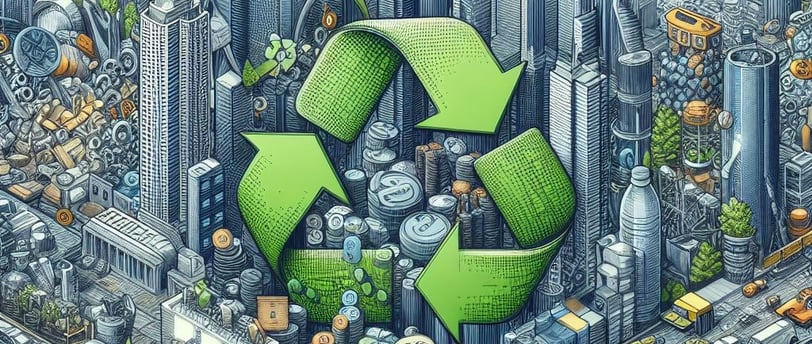The Emerging World of Recycled Commodities: A Sustainable Investment Avenue
Explore how the booming market for recycled commodities offers a unique blend of financial opportunity and environmental responsibility. Discover the role of advanced recycling technologies and the impact on sustainability, highlighting the growth and benefits of investing in materials transformed from waste to valuable resources.


In recent years, the concept of sustainability has gained significant traction across various industries. As the world grapples with the challenges of climate change and resource depletion, there is a growing recognition of the need to adopt more eco-friendly practices. One area that has emerged as a promising avenue for sustainable investment is the world of recycled commodities.
The Rise of Recycled Commodities
Recycled commodities refer to materials that have been transformed from waste into valuable resources through recycling processes. These materials include plastics, metals, paper, glass, and even electronic waste. While recycling has long been viewed as a way to reduce waste and conserve resources, it is now being recognized as a lucrative investment opportunity.
The market for recycled commodities has experienced significant growth in recent years. According to a report by Grand View Research, the global recycled plastics market size was valued at USD 37.85 billion in 2020 and is projected to reach USD 57.1 billion by 2028. This growth can be attributed to several factors, including increased awareness about environmental issues, government regulations promoting recycling, and technological advancements in recycling processes.
Technological Advancements in Recycling Processes
One of the key drivers of the growth in the recycled commodities market is the advancement of recycling technologies. Traditional recycling processes often faced limitations in terms of efficiency and the types of materials that could be recycled. However, recent innovations have overcome many of these challenges, opening up new possibilities for recycling a wider range of materials.
For example, advancements in plastic recycling technologies have made it possible to recycle more types of plastics, including those that were previously considered non-recyclable. These technologies utilize methods such as chemical recycling and pyrolysis, which break down plastics into their basic components, allowing them to be used as feedstock for new products.
Similarly, advancements in metal recycling processes have improved the efficiency of extracting valuable metals from discarded products. This not only reduces the need for mining virgin resources but also helps to mitigate the environmental impact associated with mining activities.
The Environmental Impact of Investing in Recycled Commodities
Investing in recycled commodities not only offers financial returns but also has a positive environmental impact. By diverting waste from landfills and incineration, recycling helps to reduce greenhouse gas emissions and conserve natural resources.
For instance, when plastics are recycled, it reduces the demand for new plastic production, which is a significant contributor to carbon emissions. Additionally, recycling plastics helps to prevent them from ending up in oceans and waterways, where they can harm marine life and contribute to pollution.
Investing in recycled metals also has environmental benefits. Mining and extracting metals from the earth require a significant amount of energy and can cause habitat destruction and water pollution. By investing in recycled metals, investors can support the circular economy and reduce the need for environmentally damaging mining practices.
The Circular Economy and Reduced Waste
Investing in recycled commodities is not just about financial returns and environmental impact. It is also a way to contribute to the concept of a circular economy. The circular economy aims to minimize waste and maximize the value of resources by keeping them in use for as long as possible.
By investing in recycled commodities, investors are supporting the recycling industry and creating demand for recycled products. This, in turn, encourages more recycling activities and helps to create a closed-loop system where materials are continuously recycled and reused.
Furthermore, investing in recycled commodities can help to address the growing problem of electronic waste. With the rapid advancement of technology, electronic devices are becoming obsolete at an alarming rate. Investing in the recycling of electronic waste not only helps to recover valuable materials but also prevents hazardous substances from being released into the environment.
Conclusion
The emerging world of recycled commodities offers a promising avenue for sustainable investment. With the market for recycled materials experiencing significant growth and technological advancements improving recycling processes, investing in recycled commodities has become an attractive option for eco-conscious investors.
Not only does investing in recycled commodities offer financial returns, but it also contributes to a circular economy, reduces waste, and conserves natural resources. By supporting the recycling industry, investors can play a crucial role in creating a more sustainable future.
